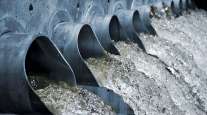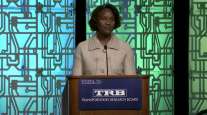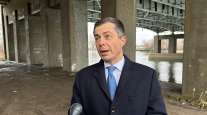Senior Reporter
Capitol Agenda for the Week of Nov. 26: One More for the Road

If you don’t travel much, but you were among the millions of Americans who set out to visit loved ones this past Thanksgiving weekend, the traffic nightmare you experienced was indeed an anomaly.
Just to be clear, traffic on the Washington Beltway isn’t always a nonstop horror show. The Delaware Memorial Bridge is not permanently closed. And traffic on the 405 tends not to be so epic (see “Favorite Tweet”).
Ironically, though, while the Turkey Day travel phenomena has become depressingly awful, congestion during the rest of the year is, at best, intolerable.
How bad is it, you may ask? Well, to put it this way, in most cities walking will get where you want to go faster than the bus or an Uber. And, since your neighbors are addicted to Amazon Prime, more trucks and large vans are out and about making deliveries in our towns and neighborhoods.
This ever-increasing demand for capacity is straining our freight and commuter corridors, and slowing us up every year (think bumper-to-bumper traffic caused by roadway construction).
The latest report from the ATRI estimates that highway congestion added around $74.5 billion in operational costs for the trucking industry in 2016. Do you think traffic has since improved or become even more challenging? https://t.co/SbTjY7iCOQ — PrePass (@PrePass) November 10, 2018
This congestion also comes at a real cost. Besides eating away precious time you and I could be spending at the gym or binge watching The Romanoffs (second Amazon reference), highway congestion hit the trucking industry with $74.5 billion in operational costs in 2016, according to a study by the American Transportation Research Institute. Other modes also experience massive operational costs.
Local, state and regional policymakers already have been responding to this congestion crisis. More than half of state governments, for instance, recently approved increases in fuel taxes to come up with more money to fix and modernize roadways, bridges and tunnels. Other states, such as Oregon, are testing alternative sources of funding to pay for infrastructure maintenance and road repairs.
On Nov. 28, transportation policymakers in the U.S. Senate will host the rare lame duck hearing to examine the country’s “Surface Transportation Infrastructure Needs.” Witnesses scheduled at this hearing include Carlos Braceras, the new president of the American Association of State Highway and Transportation Officials; Bob Lanham, vice president at Associated General Contractors of America; and James Corless, executive director of the Sacramento Area Council of Governments.
Most federal lawmakers acknowledge congestion hinders the economy. And they have responded by approving a series of short- and not-so-short-term infrastructure funding fixes. A long-term funding solution, which prominent stakeholders argue could be achieved by raising and indexing the federal fuel tax, has not been in the cards for leaders from both parties in Congress and the occupants of the White House since the Clinton administration. In the meantime, we all sit in traffic. Or, as @MelsLien said in a Nov. 25 tweet:
We’ve been stuck in a car in a rundown post-industrial town in Pennsylvania for 10 BILLION HOURS, HALP, THE APOCALYPSE https://t.co/0WyAStLBwm — Melanie Schmitz (@MelsLien) November 26, 2018
THE WEEK AHEAD (all times EST):
Nov. 29, 9:30 a.m.: Senate Environment and Public Works Committee meets to review existing concerns about surface transportation.
Nov. 27, 8 a.m.: Roll Call holds a discussion on “Election Impact: Tax Policy in 2019.” Sen. Chris Van Hollen (D-Md.) joins the conversation.
Nov. 27-28, 9 a.m.: PlanGrid hosts its 2018 Public-Private Partnerships federal conference, Nov. 27-28. Speakers include Australian Ambassador to the U.S. Joe Hockey; Jim Gebhardt, senior finance adviser at U.S. EPA; and Dinesh Mehta, manager of the Energy Department Loan Programs Office.
Nov. 27, 1:30 p.m.: The Atlantic Council’s Latin America Center and Politico host an event titled, “The United States-Mexico-Canada Agreement (USMCA) Signing: The Implications for Consumers and the Road Ahead for Congress.” Speakers include Agriculture Undersecretary for Trade and Foreign Agricultural Affairs Ted McKinney.
Nov. 28, 9 a.m.: The Washington Post hosts a sit down with acting EPA Administrator Andrew Wheeler.
Nov 28-29, 9 a.m.: The American Public Transportation Association hosts the 2018 Industry Leadership Summit.
Nov. 28, noon: The American Bar Association hosts an event titled, “Latest Developments at the Office of Special Counsel.”

National Christmas Tree lighting ceremony last year. (AL News via YouTube)
Nov. 28, 5 p.m.: The National Park Service hosts the 96th annual National Christmas Tree Lighting.
Nov. 29, 9 a.m.: The Washington Post hosts a sit down with House Speaker Paul Ryan (R-Wis.).
Nov. 29, 9:30 a.m.: The Brookings Institution examines the midterm elections and tax policy.
IN CASE YOU MISSED IT:
WINTER WONDERLAND: When winter weather arrives, what also comes with it is the use of road salt, which exacerbates truck corrosion.
SALT LIFE: September and October were record months for many of the nation’s ports as shippers prepared for a busy holiday shopping season and rushed to get cargo into the United States ahead of the Trump administration’s tariffs against several nations, including China.
BELOW AVERAGE: Pennsylvania has again earned a C- on the American Society of Civil Engineers’ infrastructure report card.
 BUZZ:
BUZZ:

Public transit programs and proposals will be among the top issues Democrats on the transportation policy committees will look to examine when the next Congress begins in January, sources tell Transport Topics.
WHAT WE’RE READING:
Rep. Peter DeFazio gets Q&A’ed.
FAVORITE QUOTE:
I don’t want people to think that the first day I walk in there, we’re going to have 38 subpoenas going out the door.
Rep. Elijah Cummings (D-Md.), on Meet The Press Nov. 25.
FAVORITE VIDEO:
In memoriam
FAVORITE TWEET:
Escape From L.A.
Our annual reminder: Widening highways doesn't work
This freeway -- LA's 405 -- was JUST widened at a cost of $1.6 billion. pic.twitter.com/vFSTmfdhnC — Streetsblog USA (@StreetsblogUSA) November 21, 2018
Thanks for reading Capitol Agenda. We publish weekly when Congress is in session. E-mail emulero@ttnews.com with tips. Follow us @eugenemulero and @transporttopics.





